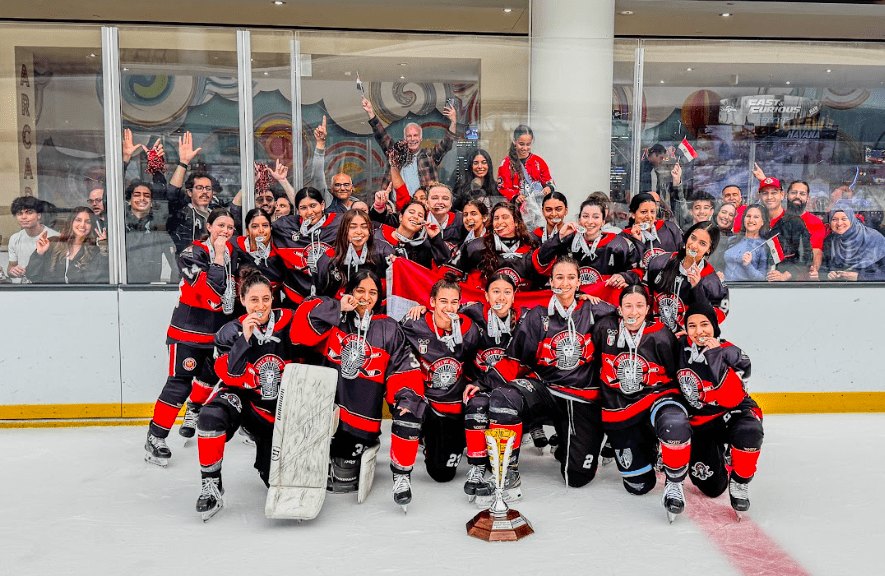Having competed at the game’s highest levels, Kendra Fisher is not only a distinguished competitor between the pipes; she would also become one of the game’s most influential. Balancing hockey with family, career and a growing legacy as a highly regarded public speaker, while also donating her time for causes such as RBC’s Run for the Kids and You Can Play as an Athlete Ambassador. Fisher has helped to shape and realize a new dimension in women’s hockey, empathically helping to provide an empowering confidence for a new generation of players.
As the stigma surrounding mental health gradually evaporates, no longer serving as a constraint, Fisher’s strength and courage is a crucial factor in helping to redefine the future. After her Winter Games dream was fractured, suffering a detour as her life became a methodical melancholy, Fisher sought to decipher the problem, working towards bringing to light the desire to strive to improve,
“I was actually part of Team Canada’s women’s hockey program and I got sick at the time. I had no idea what I was dealing with. It forced me to walk away from camp. I started to see a doctor, figuring out what was wrong. It just put me in a position to fight for my life. The next couple of years were spent trying to figure out how to be ok again.”
Deciding to speak about the problem represented a potency of emotion. In hearing about a misfortune that profoundly affected the hockey community, Fisher became introspective, a moment of truth serving as the result,
“It happened that I was sitting at the OWHA head office at a time when everything happened with Daron Richardson. Part of the problem was that people did not know help was out there, and how to help ourselves live in a place of recovery. I spoke to my psychologist, and thought I could share my story.
My heart goes out to them (the Richardson’s). Something some people show away from, turned it into something so positive, they are incredible people.”
Currently working in the health field, the opportunity to speak publicly reveals a genuine portrait. Fisher’s efforts as a public speaker has proven to be a harmonious discovery, representing an ideological freedom while helping provide a direct rebuttal towards the traditional fear of reprisal and alienation associated with those that struggle with mental health. Helping to create a new context, Fisher is contributing towards a culture of caring, a revelatory reinvention culminating in a new confidence.
“Most girls I played with had no idea what was happening. Some were shocked when I shared my story. I certainly have received a ton of support since then. There are people living with it but don’t want to talk about it. Fortunately, I have a strong family network; my wife has also been a strong support.”
Undoubtedly, family has represented a remarkable breadth for Fisher, proving to become a most sustained aspect. In addition to marriage, Fisher has plunged into the milestone of parenthood with great enthusiasm.
 “He (Finley) is just several weeks old. He was born on the Friday (before the Inline Worlds) and I had to fly to Italy on the Monday for the tournament. Just how much one little person can just consume you; it is a most incredible learning curve. I heard stories; I was told you don’t really get it until it happens to you. It fills you in the shortest amount of time. This little person, you just can’t imagine them not being there.”
“He (Finley) is just several weeks old. He was born on the Friday (before the Inline Worlds) and I had to fly to Italy on the Monday for the tournament. Just how much one little person can just consume you; it is a most incredible learning curve. I heard stories; I was told you don’t really get it until it happens to you. It fills you in the shortest amount of time. This little person, you just can’t imagine them not being there.”
The birth of her son coincided with another tremendous milestone. In a career that has seen Fisher compete at the Esso Women’s Nationals, and make history as a charter member of the Toronto Furies, she has also assembled a remarkable body of work as a member of Canada’s inline women’s hockey team, experiencing the jubilation of multiple world championships. The most recent world championship took place at the 2016 Inline Worlds in Italy, part of a magical yet exciting time,
“It was the biggest whirlwind of a week. I had not slowed down enough to fully comprehend and put things together. Then I was leaving for Italy, I had not slept for a few days. I am never going to remember it all (laughs).
(To win gold) is amazing. The inline season is different from ice hockey. It all comes together really quickly. It is awesome to see this group of girls, many who were there four years ago, come together at the end. It was great, amazing, and if it was not fun, I would not be there.”
Although mental health struggles can impact the successful navigation of life’s stormy waters, individuals like Fisher, who currently works in the health field, embody the vast potential in which fear will no longer a subtle element, but a harmonious discovery towards improvement. As Fisher reveals, the opportunity to speak and advise others of her own struggles provides a tranquil introspection,
“It is very therapeutic I find. I guess I spent so many years fighting myself most of the time, feeling so ashamed, no one else knew what was going on. It starts the conversation with a new group of people. To talk about things reminds me how bad it really was and the things I need to do to stay healthy. Mental health is really a large crisis in this country. The knowledge and growing support over the years, it is something I am extremely comfortable in dealing with.”
Serving as a strong voice, Fisher’s presence is of benefit as a mentor for many players in women’s hockey. Taking into account the feeling of family that defines the sport, Fisher’s courage is a wellspring of inspiration.
“Ongoing, women’s hockey is a tight-knit community. A lot of girls I still cross paths with on occasion, some I have not seen in awhile, will reach out for guidance and peer support.”
Traditionally, athletes are perceived as everlasting, capable of an eternity of glory. The concept of fragility or the transient discernment only serves to deconstruct the illustrious myth of athlete as god-like. Of note, the last few years has seen several notable athletes, such as Super Bowl champion Terry Bradshaw, former NBA star Kendall Gill and home run king Darryl Strawberry, disclose in retirement (or in the twilight of careers) their struggles with mental health.
transient discernment only serves to deconstruct the illustrious myth of athlete as god-like. Of note, the last few years has seen several notable athletes, such as Super Bowl champion Terry Bradshaw, former NBA star Kendall Gill and home run king Darryl Strawberry, disclose in retirement (or in the twilight of careers) their struggles with mental health.
In addition to Fisher, former WNBA star (and first overall draft pick) Chamique Holdsclaw, along with two-sport icon Clara Hughes, a proud supporter of Do It for Daron, are other members of the female sporting community that have discussed their own difficulties. As women continue to work tirelessly for sporting equality, the efforts of accomplished athletes such as Fisher to speak out signifies an encouraging doctrine. If an athlete suffered from a physical injury, trepidation to reveal it would be to no avail.
Therefore, feelings of anxiety and gloominess should not be considered a decline in an athlete’s potential to perform, but as an opportunity to work towards treatment while conscientiously working towards achieving balance. The fastidious determination of courageous individuals such as Fisher is helping to augment discussion and build towards a cultural movement that shall hold a more positive outcome,
“There is information but still a lot of work to do. The stigma of weak athletes, the risk I guess, for them to feel honest and deal with it is a very precarious gray area for athletes. There may be concern they may not be seen as best player. I deal with that a lot. Many look to get advice. They see how I have done it and how I manage it.
When you play at a world level, there is a different lifestyle, a different mindset. They appreciated that I can understand that aspect and deal with it.” #mentallyfit
“All quotes obtained first hand unless otherwise indicated”
Images obtained from: http://support.rbcraceforthekids.ca/site/PageNavigator/RFTK15/Youth/Kendras_story.html and https://twitter.com/kendra_fisher30?lang=en
For more information on Kendra Fisher, please visit: http://www.kendrafisher.com/index.php
[adrotate group=”1″]
Related Articles
Categories
Recent Posts
[adrotate group=”2″]





